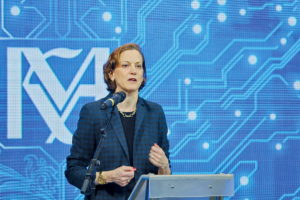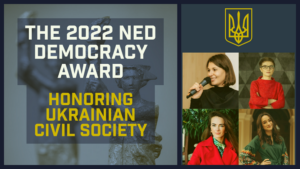Ukraine needs a measured lustration policy to strengthen security and rebuild its democracy, say analysts Geoff Dancy, Kathryn Sikkink, Mykhailo Soldatenko, and Patrick Vinck.
As it has been practiced in countries such as Germany, Bosnia, and Iraq, lustration typically aims to identify people who have violated human rights or engaged in other compromising activities under a previous hostile regime or recent enemy occupation, they write for Foreign Affairs. Based on their past conduct and associations, such individuals may pose a significant threat to democracy. The goal is often to temporarily prevent these people from holding public positions, thereby safeguarding the democratic process.
 The idea that this war cannot be won or can only end by a negotiation giving Moscow something it can claim as a victory represents a failure of both the will and the imagination, argues Stephen Blank, a senior fellow at the Foreign Policy Research Institute (FPRI). Apart from its moral failings, this view fails the acid test of Realpolitik because it betrays the national interests not only of Ukraine but also of Washington and its allies, he writes for The Hill.
The idea that this war cannot be won or can only end by a negotiation giving Moscow something it can claim as a victory represents a failure of both the will and the imagination, argues Stephen Blank, a senior fellow at the Foreign Policy Research Institute (FPRI). Apart from its moral failings, this view fails the acid test of Realpolitik because it betrays the national interests not only of Ukraine but also of Washington and its allies, he writes for The Hill.
Some people are clearly thinking about what comes next, adds Anne Applebaum (below). Although no evidence indicates that Yevgeny Prigozhin, the leader of the Wagner mercenaries, is actively trying to eliminate Putin, he does seem to be part of a competition to replace him, should the Russian president accidentally fall out a window, she writes for The Atlantic:
During an interview Monday, he mocked the luxurious life of Russian Defense Minister Sergei Shoigu’s daughter, implied that Shoigu himself is lazy, and described the chief of the general staff throwing “paranoid tantrums, yelling and squealing at anyone surrounding him.” We are, he said, “two months away from the firing squads”—by which he meant the firing squads that will eliminate these degenerate leaders. One Russian officer who said he had been captured and interrogated by the Wagner Group issued a statement claiming that Prigozhin’s men were threatening and humiliating Russian soldiers. Prigozhin, in turn, says the regular Russian army opened fire on his mercenaries and left land mines to obstruct their movement.

The transformative experience of war could become a transformative experience for the Ukrainian state, its citizens, and investors that would ultimately lead to increased public trust and economic growth, notes Henrik Larsen, a senior researcher at the Center for Security Studies at the Swiss Federal Institute of Technology Zurich.
Ukraine’s victory is not only about repelling Russian aggression. It is also about showcasing the country’s reformed governance model to its own citizens and to the Russian people living under the autocratic Putin regime, he writes for the Texas National Security Review. Ukraine’s domestic success would serve the broader interest of highlighting the benefits of the Western model in comparison to other illiberal contenders, especially China, illiberal forces in West-leaning countries like Turkey and Georgia, and the Global South.

It’s not yet clear whether the current counteroffensive – what POLITICO’s Jamie Dettmer calls Ukraine’s D-Day – is focused on severing the land bridge in southern Ukraine connecting Russia and the occupied Donbas region with the Crimean peninsula, which “seems the logical direction,” or on making gains in eastern Ukraine, which is “a less-anticipated move but possible for just that reason,” says Dan Fried (@AmbDanFried), the Atlantic Council’s Weiser family distinguished fellow and former US ambassador to Poland
There are “tensions in Russia’s ruling elite, and even signs of panic,” says Fried, a board member of the National Endowment for Democracy (NED), adding that “Ukrainian victory on the battlefield does not have to expel all Russian forces from all Ukrainian territory to change the strategic balance and make Putin’s maximal demands untenable.”
Anders Åslund, an economist and adjunct professor at Georgetown University, Washington, DC, also believes the Russian leader has become increasingly concerned about his domestic stability in Russia. There have been recent attacks by Russian anti-Putin militia groups in the Belgorod region, which borders Ukraine, Newsweek reports.
“It’s also important that these incursions into the bordering regions show that Russia cannot defend its own border. So, all of a sudden, Putin has spoken about it repeatedly, ‘it’s a question of our country’s survival,‘” said Åslund, who has served as an economic adviser to the governments of Russia and Ukraine.

The conflict has had profound impacts on Russian civil society, USIP adds. Following Russia’s full-scale invasion in February 2022, millions of Russians left the country to avoid supporting the war or being conscripted into the military. With Russian civil society fragmented and located in different countries, they are searching for ways to express their resistance to the war as well as remain engaged and active with one another.
Putin needs Ukraine’s people to reinforce the hegemony of Orthodox Slavs in the Russian Federation, analyst Walter Russell Mead contends. Without them, faced with rising populations in Central Asian countries like Uzbekistan (up 63% since the fall of the Soviet Union to an estimated 35 million in 2023), Russian nationalists foresee only doom and decline, he writes for The Wall Street Journal:
These considerations underline how committed hard-core Russian nationalists are to victory in Ukraine and how globally consequential a Russian defeat would be. A Ukrainian victory would leave a weakened and discredited Kremlin squeezed by a powerful China and a rising Central Asia in the east, a reinvigorated security alliance in the west, and restive ethnic minorities at home.
A USIP conversation (above) addresses the potential long-term implications for Russian civil society and government, with Yevgenia Albats, Distinguished Journalist in Residence, Jordan Center for the Advanced Study of Russia, New York University; Timothy M. Frye, Marshall D. Shulman Professor of Post-Soviet Foreign Policy, Columbia University; Angela Stent, Senior Advisor, Russia and Europe Center, U.S. Institute of Peace; Joshua Tucker, moderator, Professor of Politics, Director of the Jordan Center for the Advanced Study of Russia, New York University.
Even Henry Kissinger, who used to caution about extending NATO membership to former Soviet republics, now says that Ukraine should be made a member of NATO, given that for all intents and purposes, given all that we have provided to Ukraine, NATO’s security is at the border between Ukraine and Russia, retired four star general David Petraeus told DW (below).
#Lustration targets those who violate human rights or engaged in compromising activities under a previous regime or occupation, posing a threat to #democracy, #GeoffDancy @kathryn_sikkink #MykhailoSoldatenko & @developmentdata write for @ForeignAffairs. https://t.co/XfvQPWHhKP
— Democracy Digest (@demdigest) June 8, 2023
The West’s dilemma with Ukraine is also worth comparing to E.U. enlargement, adds Larsen, who served as a political advisor with the E.U. Delegation to Ukraine during 2017–19 and the E.U. Advisory Mission Ukraine during 2014–17. The prospect of E.U. membership no longer has the wide public appeal that it had 10 or 15 years ago in the Western Balkans and Turkey, all countries that struggle with stagnant economies and problems with the rule of law and democracy. One cannot exclude the possibility that the Ukrainian public will experience similar disillusionment if reforms again disappoint and if the European Union, in turn, gets fatigued with Ukraine.
Ukrainian oligarchs — a handful of very wealthy individuals who benefited disproportionately from post-Soviet privatization — have continued to cultivate informal links to the media, political parties, and the government, which has given them influence over the law-enforcement agencies, the courts, and state-owned enterprises, Larsen cautions. Their abuse of high-level power and state capture thus hinders competition and growth, harms the democratic process, and helps to justify petty corruption in society at large.
The Kyiv School of Public Administration hosts a Summer School of Democracy with Stanford University’s Larry Diamond, a co-founder and former co-editor of the Journal of Democracy, published by the National Endowment for Democracy (NED). Further details here.







